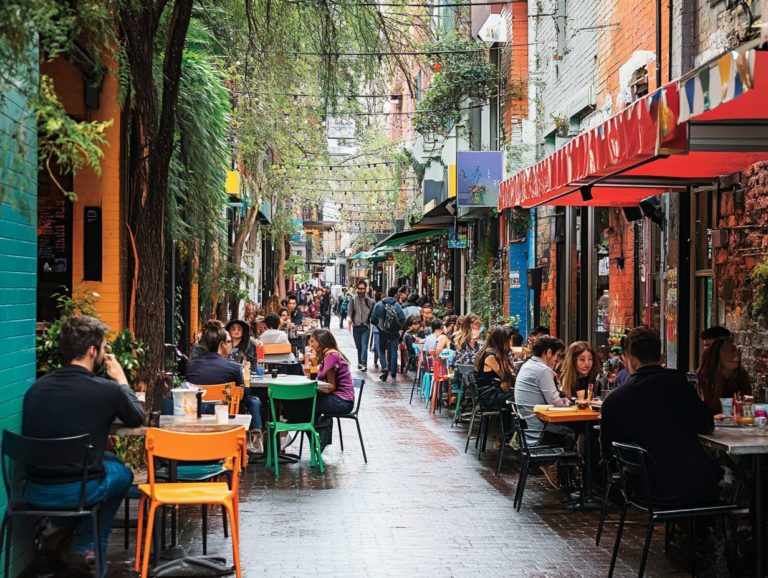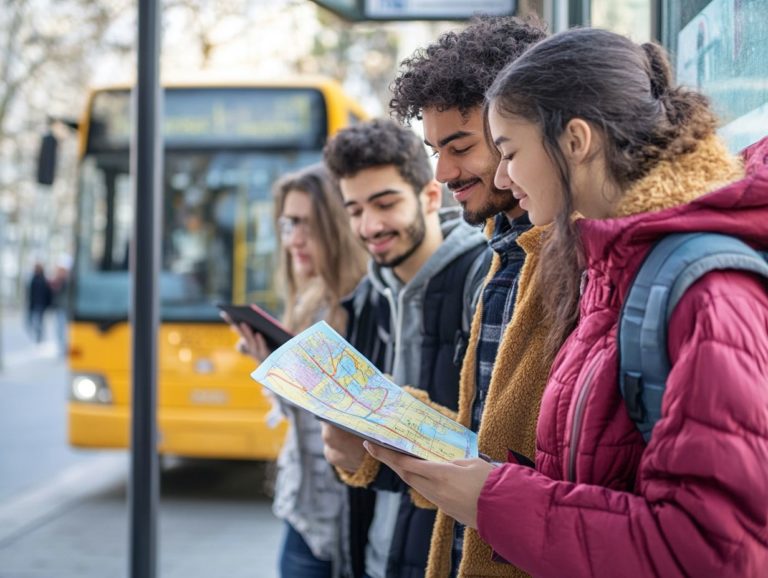Tips for Adjusting to Life in a New Culture
Adjusting to a new culture can be both thrilling and intimidating. You ll find yourself navigating cultural differences and unique communication styles while managing emotional and mental shifts that accompany this journey.
This exploration delves into practical strategies for coping with culture shock, offering you valuable tips on how to adapt effectively. It also highlights the joy of embracing local customs and underscores the enriching benefits that cultural diversity brings to your life.
Whether you’re relocating for work, study, or simply seeking adventure, grasping these aspects can smooth your transition and enhance your overall experience.
Contents
Key Takeaways:
Cultural differences can create communication challenges.
Practical strategies and seeking support are vital to coping with culture shock.
Embrace local customs and appreciate diversity to ease your adjustment.
Challenges of Adjusting to a New Culture
The journey of adapting to a new culture can be both exhilarating and daunting, especially for foreign students embarking on a study abroad adventure. This transition often unveils the nuances of culture shock, where you may encounter emotional hurdles arising from language barriers, unfamiliar local customs, and feelings of frustration and isolation.
Successfully navigating these challenges demands resilience and a sharp awareness of the culture around you, which can differ dramatically between countries like South Korea and the United States.
Cultural Differences and Communication
Cultural differences can greatly influence communication styles, often resulting in misunderstandings or missed connections, especially in culturally diverse settings like study abroad programs.
These disparities arise not only from different languages but also from distinct traditions and social cues, creating barriers to engaging conversations. As a foreign student, you may find yourself navigating a complex web of cultural norms that shape how you express yourself and interpret messages. Language differences can lead to misinterpretations, impacting both casual interactions and academic collaborations.
To bridge these gaps, local newspapers and community resources serve as invaluable tools, providing insights into local culture and language nuances. By tapping into these resources, you can connect more meaningfully with your surroundings and cultivate a genuine sense of belonging in your new environment.
Emotional and Mental Adjustments

Emotional and mental adjustments are essential when you’re adapting to a new culture. Many foreign students grapple with feelings of frustration and isolation during this transition.
These emotional hurdles can show up in various ways, leading to anxiety and homesickness that can impede your academic performance and social integration. It’s crucial to remember that you’re not alone in this journey; countless others are navigating similar struggles.
Exploring effective coping strategies, such as participating in cultural exchange programs or joining student organizations that celebrate diversity, can significantly bolster your emotional resilience. Well-being and counseling centers serve as invaluable resources, providing support and guidance tailored to the unique challenges you face in a new cultural environment.
By engaging with these resources, you can foster personal development and cultivate a true sense of belonging.
Strategies for Coping with Culture Shock
Coping with culture shock requires you to adopt proactive strategies that can greatly enrich your experience as a foreign student studying abroad. Start using these strategies today to make your journey smoother!
Practical Tips for Adapting
Practical tips for getting used to a new culture can truly empower you as a foreign student. For instance, exploring the top 10 tips for adapting to a new culture allows you to embrace cultural adjustment while diving into local customs and engaging in meaningful language learning.
Take the time to learn essential phrases and greetings in the local language. This enhances your interactions and helps forge genuine connections within the community.
Attending workshops or classes focused on cultural practices offers invaluable insights and presents opportunities to meet locals and expand your network.
Participating in festivals and community events immerses you in traditional celebrations, enriching your understanding of the local way of life.
Joining clubs or groups that promote sharing experiences and traditions with others can elevate your experience, fostering friendships and broadening your perspectives in a welcoming environment.
Engaging with diverse food markets or art exhibitions can also serve as a fantastic way to understand local values and history.
Seeking Support and Resources

Seeking support and using available resources are essential steps for you as a foreign student navigating the emotional challenges of culture shock. This is crucial for fostering a sense of belonging in a diverse environment.
Establish connections with wellbeing and counseling centers. These centers can significantly enhance your experience by offering tailored guidance and emotional support to help you thrive.
They often provide workshops and programs focused on promoting cultural awareness and sensitivity, which is a fantastic way to help you navigate your new surroundings.
Leveraging research resources allows you to explore the intricacies of cultural diversity. This deepens your understanding and appreciation of different backgrounds.
Engaging in networking opportunities facilitates social integration. It creates a vital support system, enabling you to share experiences and form meaningful relationships that help alleviate feelings of isolation.
Embracing and Appreciating the New Culture
Embracing and appreciating the new culture is a rewarding journey for foreign students. This endeavor fosters a deeper understanding of cultural diversity and enriches your study abroad experience in ways you may never have imagined.
Learning and Participating in Local Customs
Learning about and participating in local customs is essential for you as a foreign student aiming to forge connections and engage in meaningful conversations within your new cultural landscape.
Immerse yourself in the vibrant tapestry of local traditions. This not only enriches your academic journey but also helps cultivate lasting relationships with your peers.
Festivals, whether marking seasonal changes or celebrating community milestones, provide a unique window into the area s heritage and values.
Embracing local cuisine from tantalizing street food to cherished family recipes creates shared experiences that transcend language barriers.
Joining cultural clubs or attending community events presents excellent opportunities for you to explore diverse perspectives and gain firsthand insight into the customs that shape your host society.
Such engagement enhances your cultural understanding and fosters a genuine sense of belonging.
Recognizing the Benefits of Cultural Diversity

Recognizing the benefits of cultural diversity can greatly improve your personal growth as a foreign student. It transforms emotional challenges into enriching experiences while you study abroad.
Embracing diverse perspectives opens you to new ideas and ways of thinking. This exposure helps you build a global network of friends and professionals.
It also enhances your adaptability and understanding, sharing the feelings of others qualities essential in today s interconnected world. These interactions can be vital for support.
They help alleviate feelings of isolation in unfamiliar environments. Connecting across cultures fosters a sense of belonging and turns challenges into opportunities for growth.
Ultimately, this contributes to your overall well-being.
Frequently Asked Questions
What are some tips for adjusting to life in a new culture?
1. Take time to learn about the culture before you arrive. Research customs, traditions, and social norms.
2. Be open-minded and embrace new experiences. Try new foods, attend local events, or make new friends.
3. Seek out a support system. Join expat groups, connect with locals, or reach out to friends and family.
4. Be patient with yourself during this adjustment. It takes time to adapt, so enjoy the journey!
5. Communicate openly and respectfully with locals. Ask questions, show interest in their culture, and be mindful of differences.
6. Keep a positive attitude. Adjusting to a new culture can be tough, but it’s also a rewarding adventure! For more insights, check out what to expect: the stages of cultural adjustment.






